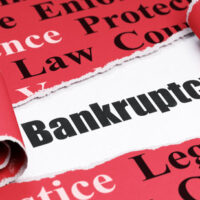Exceptions to Discharge

If you are considering bankruptcy, you may believe that all of your debts will be completely erased. However, this is not always true. In fact, a Chapter 13 bankruptcy does not eliminate as much debt due to the fact that the debtor simply agrees to a repayment plan over a period of years. However, many debts are discharged in Chapter 7 bankruptcy. While many types of debt are dischargeable in bankruptcy, such as medical bills, credit card bills and most consumer debt, there are some notable exceptions that will never be discharged in bankruptcy.
Nondischargeable Debts
Section 523(a) of the Bankruptcy Code states that there are certain debts that are automatically excluded from being dischargeable in the bankruptcy process. Those nondischargeable debts include the following:
- Debts not listed in the bankruptcy (Also known as unscheduled debts)
- Most taxes
- Fines, penalties or debts owed to the government
- Student loans
- Child Support
- Alimony
- Debts owed under a divorce decree
- Debts owed for personal injuries due to a DUI
- Money owed to retirement plans
- Homeowners association fees
- Some attorney fees
- Court fines or penalties
- Criminal restitution
Objection of Creditor
There are other circumstances under which debt will not be considered dischargeable in bankruptcy. These cases are typically when a creditor has specifically requested that a debt not be discharged. Some of the following are examples of where a creditor may attempt to exclude their debt from discharge in a bankruptcy case.
- Cash Advances
- Fraudulent Debts
- Debts Occurring from Willful and Malicious Injury
- Credit Card Purchases for Large Amounts
- Debts from Breach of Fiduciary Duty, Embezzlement, or Larceny
In the cases of cash advances or credit card purchases, oftentimes a debtor will know that they are going to declare bankruptcy and therefore charge large purchases hoping that they will be eliminated from the obligation to pay for those items. If debts are incurred shortly before a bankruptcy is filed, a court may believe that these items were intentionally purchased in an attempt to defraud the creditor and will therefore not discharge these debts from the bankruptcy.
Other Exceptions to Discharge
Other circumstances also exist that would allow debt to remain owed by the debtor even after declaring bankruptcy. For example, if a debtor commits perjury in the court, intentionally destroys evidence, attempts to hide property or assets from the court, or in any way attempts to defraud the court, a court may refuse to discharge debts that would under other circumstances be considered dischargeable.
Contact an Experienced Bankruptcy Attorney
Understanding which debt may be discharged in your bankruptcy can be complex and involve several technical issues. Understanding the bankruptcy process can help ensure that your rights are protected. Contact one of our experienced West Palm Beach bankruptcy attorneys at Kelley Kaplan & Eller at 561-264-6850 for a consultation regarding what type of bankruptcy you should file, how to go about the filing process, which of your debts will be discharged, and how to ensure that your rights are protected.
Resource:
uscourts.gov/services-forms/bankruptcy/bankruptcy-basics/discharge-bankruptcy-bankruptcy-basics
https://www.kelleylawoffice.com/how-bankruptcy-may-affect-your-credit-score/



